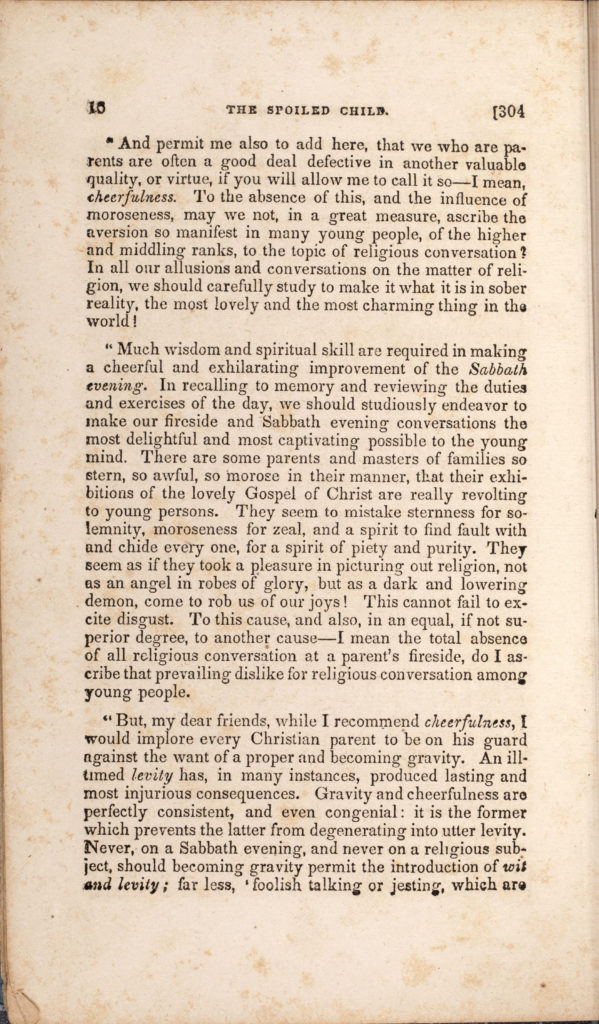Pg. 304

¶ 1 Leave a comment on paragraph 1 0 16 THE SPOILED CHILD. [304
¶ 2 Leave a comment on paragraph 2 0 “And permit me also to add here, that we who are pa- rents are often a good deal defective in another valuable quality, or virtue, if you will allow me to call it so—I mean, cheerfulness. To the absence of this, and the influence of moroseness, may we not, in a great measure, ascribe the aversion so manifest in many young people, of the higher and middling ranks, to the topic of religious conversation? In all our allusions and conversations on the matter of religion, we should carefully study to make it what it is in sober reality, the most lovely and the most charming thing in the world!
¶ 3 Leave a comment on paragraph 3 2 “Much wisdom and spiritual skill are required in making a cheerful and exhilarating improvement of the Sabbath evening. In recalling to memory and reviewing the duties and exercises of the day, we should studiously endeavor to make our fireside and Sabbath evening conversations the most delightful and most captivating possible to the young mind. There are some parents and masters of families so stern, so awful, so morose in their manner, that their exhibitions of the lovely Gospel of Christ are really revolting to young persons. They seem to mistake sternness for solemnity, moroseness for zeal, and a spirit to find fault with and chide every one, for a spirit of piety and purity. They seem as if they took a pleasure in picturing out religion, not as an angel in robes of glory, but as a dark and lowering demon, come to rob us of our joys! This cannot fail to excite disgust. To this cause, and also, in an equal, if not superior degree, to another cause—I mean the total absence of all religious conversation at a parent’s fireside, do I ascribe that prevailing dislike for religious conversation among young people.
¶ 4
Leave a comment on paragraph 4 1
“But, my dear friends, while I recommend cheerfulness, I would implore every Christian parent to be on his
guard against the want of a proper and becoming gravity. An ill-timed levity
has, in many instances, produced lasting and most injurious consequences.
Gravity and cheerfulness are perfectly consistent, and even congenial: it is
the former which prevents the latter from degenerating into utter levity.
Never, on a Sabbath evening, and never on a religious subject, should becoming
gravity permit the introduction of wit and levity; far less, ‘foolish
talking or jesting, which are
The evening of the seventh night of the week. The entirety of the day is sacred and is designed for rest and religious purposes. It is seen as a day of worship and Is commonly held on Sundays but in some cultures is observed on Saturdays.
Hacker, Omer . “Sabbath”. In obo in Jewish Studies. 28 Oct. 2022. <https://www.oxfordbibliographies.com/view/document/obo-9780199840731/obo-9780199840731-0211.xml>.
Definition: “In Biblical language, as an attribute of God: passionate love or care which will tolerate no unfaithfulness or disobedience.”
“zeal, n.” OED Online, Oxford University Press, September 2022, http://www.oed.com/view/Entry/232724. Accessed 28 October 2022.